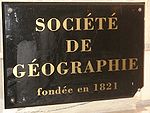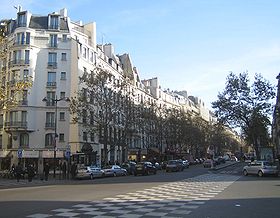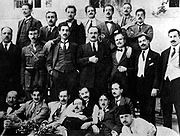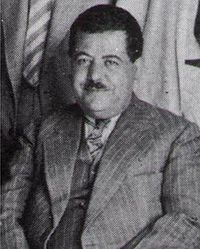
Arab Congress of 1913
Encyclopedia

Société de Géographie
The Société de Géographie , is the world's oldest geographical society. It was founded in 1821 . Since 1878, its headquarters has been at 184 Boulevard Saint-Germain, Paris. The entrance is marked by two gigantic caryatids representing Land and Sea...
) at 184 Boulevard Saint-Germain
Boulevard Saint-Germain
The Boulevard Saint-Germain is a major street in Paris on the Left Bank of the Seine river. It curves in a 3.5 kilometer arc from the Pont de Sully in the east to the Pont de la Concorde in the west and traverses the 5th, 6th and 7th arrondissements...
from June 18–23 in Paris to discuss reforms to grant Arabs more autonomy under the Ottoman Empire
Ottoman Empire
The Ottoman EmpireIt was usually referred to as the "Ottoman Empire", the "Turkish Empire", the "Ottoman Caliphate" or more commonly "Turkey" by its contemporaries...
. It took place at a time of uncertainty and change in the Ottoman Empire
Ottoman Empire
The Ottoman EmpireIt was usually referred to as the "Ottoman Empire", the "Turkish Empire", the "Ottoman Caliphate" or more commonly "Turkey" by its contemporaries...
in the years leading up to World War I. The Empire had undergone a revolution and a coup by the Young Turks
Young Turks
The Young Turks , from French: Les Jeunes Turcs) were a coalition of various groups favouring reformation of the administration of the Ottoman Empire. The movement was against the absolute monarchy of the Ottoman Sultan and favoured a re-installation of the short-lived Kanûn-ı Esâsî constitution...
in 1908. Arabs were agitating for more rights under the fading empire and early glimmers of Arab nationalism
Arab nationalism
Arab nationalism is a nationalist ideology celebrating the glories of Arab civilization, the language and literature of the Arabs, calling for rejuvenation and political union in the Arab world...
were emerging. A number of dissent and reform-oriented groups formed in Greater Syria
Greater Syria
Greater Syria , also known simply as Syria, is a term that denotes a region in the Near East bordering the Eastern Mediterranean Sea or the Levant....
, Palestine
Palestine
Palestine is a conventional name, among others, used to describe the geographic region between the Mediterranean Sea and the Jordan River, and various adjoining lands....
, Constantinople
Constantinople
Constantinople was the capital of the Roman, Eastern Roman, Byzantine, Latin, and Ottoman Empires. Throughout most of the Middle Ages, Constantinople was Europe's largest and wealthiest city.-Names:...
, and Egypt
Egypt
Egypt , officially the Arab Republic of Egypt, Arabic: , is a country mainly in North Africa, with the Sinai Peninsula forming a land bridge in Southwest Asia. Egypt is thus a transcontinental country, and a major power in Africa, the Mediterranean Basin, the Middle East and the Muslim world...
. Zionist immigration to Palestine was increasing, and England and France were expressing interest in the region, competing for spheres of influence.

World War I
World War I , which was predominantly called the World War or the Great War from its occurrence until 1939, and the First World War or World War I thereafter, was a major war centred in Europe that began on 28 July 1914 and lasted until 11 November 1918...
began. Many scholars place the origins of Arab nationalism
Arab nationalism
Arab nationalism is a nationalist ideology celebrating the glories of Arab civilization, the language and literature of the Arabs, calling for rejuvenation and political union in the Arab world...
during these crucial years that witnessed a dwindling of empires and a build-up of tension surrounding Zionist immigration to Palestine and Arab reaction to it.
Ottoman Empire
The Ottoman EmpireOttoman Empire
The Ottoman EmpireIt was usually referred to as the "Ottoman Empire", the "Turkish Empire", the "Ottoman Caliphate" or more commonly "Turkey" by its contemporaries...
was in a state of decline at the beginning of the 20th century. In 1908, a revolt led by the Young Turks
Young Turks
The Young Turks , from French: Les Jeunes Turcs) were a coalition of various groups favouring reformation of the administration of the Ottoman Empire. The movement was against the absolute monarchy of the Ottoman Sultan and favoured a re-installation of the short-lived Kanûn-ı Esâsî constitution...
led to regime change that briefly led to increased freedom of expression until the Turkish crackdown of 1915-1916. Attempts by the regime to contain Western influence, implement an increasingly centralized government, and movement toward the "Turkification
Turkification
Turkification is a term used to describe a process of cultural or political change in which something or someone who is not a Turk becomes one, voluntarily or involuntarily...
" of Arab lands prompted resistance from parts of the Arab world. War broke out in the Balkans
Balkans
The Balkans is a geopolitical and cultural region of southeastern Europe...
in October 1912, further weakening Istanbul's hold over its domain. (N)
Arab nationalism
Scholars disagree over when exactly Arab nationalismArab nationalism
Arab nationalism is a nationalist ideology celebrating the glories of Arab civilization, the language and literature of the Arabs, calling for rejuvenation and political union in the Arab world...
began, but there were glimmers of a distinctive Arab identity beginning to form, partly in response to perceived Ottoman oppression, in the years leading up to the Arab Congress. Particular concerns included the desire to speak Arabic in the public sphere, a decentralized administration (i.e. more local control over administrative matters), and the right for Arab soldiers to serve in their own region, rather than a distant corner of the empire.
Reform organisations
A number of reform-minded groups sprung up in these early years before World War I. Many remained secret so as to avoid government infiltration.
- The Young Arab Society, "al-Fatat," (Paris, 1911)
- called for the Arab congress in order to "demonstrate the unity and strength of the Arab movement" as well as to discuss reforms (Thomas)
- members: Abd al-Ghani al-Uraysi, Jamil Mardam BeyJamil Mardam BeyJamil Mardam Bey ,, was a Syrian politician, Born in Damascus to a prominent aristocratic Sunni Muslim family. He is descended from Ottoman's general, statesman, and Grand Vizier Lala Kara Mustafa Pasha...
, and Awni Abd al-HadiAwni Abd al-HadiAwni Abd al-Hadi, , was a Palestinian political figure. He was educated in Beirut, Istanbul, and at the Sorbonne University in Paris. His wife was Tarab Abd al-Hadi, a Palestinian activist and feminist....
, Palestinian Rafiq al-TamimiRafiq al-TamimiMuhammad Rafiq al-Tamimi was a Palestinian Arab educator and political figure in the 20th century. He was appointed to the Arab Higher Committee in 1945 and was the chairman of al-Najjada.-Early life:...
, the Iraqi Tawfiq al-SuwaidiTawfiq al-SuwaidiTawfiq al-Suwaidi was an Iraqi politician who served as Prime Minister of Iraq on three occasions:* April 28, 1929 - August 25, 1929* February 23, 1946 - May 31, 1946* February 5, 1950 - September 4, 1950....
, Ahmad Rustum Haydat, and Ahmad Qadri, among others
- Arab League Society, "Jam'iyyat al-Jami'a al-'Arabiyya," (Cairo, 1910)
- Rashid RidaRashid RidaMuhammad Rashid Rida is said to have been "one of the most influential scholars and jurists of his generation" and the "most prominent disciple of Muhammad Abduh"...
, founder (N) - secret reform society whose goal was "to promote and safeguard Arab rights." (N)
- Rashid Rida
- Beirut Reform Society, "Jam'iyyat Beirut al-'Islahiyya," (Beirut, 1912)
- sent a delegation of six to the conference
- members: Ahmad Bayhum, among others
- wanted French government to pressure the Unionist government to grant desired reforms
- Ottoman Party for Administrative DecentralizationOttoman Party for Administrative DecentralizationThe Ottoman Party for Administrative Decentralization or was a political party in the Ottoman Empire founded in January 1913. Based in Cairo, OPAD called for the reform of the Ottoman provincial administration for Arab provinces rather than outright independence. The executive committee consisted...
, or "Hizb al-Lamarkaziyyah al-Idariyyah al-Uthmani" (Cairo, 1912)
- Al Ahd, "The Covenant SocietyCovenant SocietyThe Covenant Society was a political group organized in 1913, mainly by Iraqi officers serving in the Ottoman military. Most of these officers would serve in Sharif Husayn's army during the Arab Revolt and later in Faisal's Syrian army...
" (1914)- 'Aziz 'Ali al-Misri'Aziz 'Ali al-MisriAziz Ali al-Misri was the co-founder of Al-gahtaniyya and al-‘ahd .-Early Life and Background:Aziz Ali al-Misri was born of both Egyptian and Circassian ancestry. His father, Zakariya, and previous relatives on his father’s side of the family were Circassian, with the original family name before...
, founder and Ottoman Arab officer - supported unity between Arabs and Turks
- largely consisted of army officers, including Yasin and Taha al-Hashimi, Salim al-Jaza'iri, Ali al-Nashashibi, Salim al-Tabbakh, Mustafa Wasfi, Isma'il al-Saffar, and Nuri al-Sa'id, among others.
- supported a "call for Arab independence...respect for Islamic values...and the institution of the Caliphate." (ayyad)
- 'Aziz 'Ali al-Misri
- Ligue de la Patrie Arabe, "League of Arab Patriots," (1904, Paris)
- founded by Najib Azuri
- goal was to free greater SyriaSyriaSyria , officially the Syrian Arab Republic , is a country in Western Asia, bordering Lebanon and the Mediterranean Sea to the West, Turkey to the north, Iraq to the east, Jordan to the south, and Israel to the southwest....
and IraqIraqIraq ; officially the Republic of Iraq is a country in Western Asia spanning most of the northwestern end of the Zagros mountain range, the eastern part of the Syrian Desert and the northern part of the Arabian Desert....
from Turkish domination
- Committee of Union and ProgressCommittee of Union and ProgressThe Committee of Union and Progress began as a secret society established as the "Committee of Ottoman Union" in 1889 by the medical students İbrahim Temo, Abdullah Cevdet, İshak Sükuti and Ali Hüseyinzade...
(CUP)
- Literary Society, "al-Muntada al-Adabi," (IstanbulIstanbulIstanbul , historically known as Byzantium and Constantinople , is the largest city of Turkey. Istanbul metropolitan province had 13.26 million people living in it as of December, 2010, which is 18% of Turkey's population and the 3rd largest metropolitan area in Europe after London and...
)- 'Abd al-Karim al-Khalil, president
- as many as 1000 members (N)
- composed of Arab expatriots in Istanbul
- al-Khalil was executed for treasonTreasonIn law, treason is the crime that covers some of the more extreme acts against one's sovereign or nation. Historically, treason also covered the murder of specific social superiors, such as the murder of a husband by his wife. Treason against the king was known as high treason and treason against a...
in 1915
Background
Jewish immigrants had begun arriving in historic Palestine before 1900. By 1913 there was concern among Arab communities that the Zionist settlers desired to settle Arab lands at the exclusion of the Arabs.England and France were showing interest in the region as the two empires competed with one another for influence. Scholar David Thomas contends that many of the reform groups that participated in the conference "...were more suspicious of the intentions of Britain and France in the Levant
Levant
The Levant or ) is the geographic region and culture zone of the "eastern Mediterranean littoral between Anatolia and Egypt" . The Levant includes most of modern Lebanon, Syria, Jordan, Israel, the Palestinian territories, and sometimes parts of Turkey and Iraq, and corresponds roughly to the...
than afraid of and hostile to the Ottoman Porte..."
The Congress was held under the auspices of the French Ministry of Foreign Affairs.
Congress timeline
- April 4, 1913: al-Fatat invites the Ottoman Party for Administrative DecentralizationOttoman Party for Administrative DecentralizationThe Ottoman Party for Administrative Decentralization or was a political party in the Ottoman Empire founded in January 1913. Based in Cairo, OPAD called for the reform of the Ottoman provincial administration for Arab provinces rather than outright independence. The executive committee consisted...
and the Muslim Friends Club to send delegates to the Congress. - April 11, 1913: Ottoman Party for Administrative DecentralizationOttoman Party for Administrative DecentralizationThe Ottoman Party for Administrative Decentralization or was a political party in the Ottoman Empire founded in January 1913. Based in Cairo, OPAD called for the reform of the Ottoman provincial administration for Arab provinces rather than outright independence. The executive committee consisted...
accepts invitation. - May 30, 1913: Delegates from several groups begin to arrive in Paris.
- June 18, 1913: Congress begins.
- June 23, 1913: Congress ends.
Attendees
While there were 25 "official" delegates, many representatives of reform societies attended unofficially. The following is a partial list of both official and unofficial individuals:
- Abd al-Ghani al-Uraysi, member of Preparatory Committee
- Abd al-Hamid al-Zahrawi (president of Congress and later executed by the Turks)
- Abd al-Karim al-Khalil (official delegate but did not attend sessions)
- Ahmad Mukhtar Beyhum, Muslim member of Beirut delegation
- Albert Sursuq, Christian member of Beirut delegation
- Ayyub Thabit, Christian member of Beirut delegation
- Daud Barakat
- George Samne, a Lebanese Christian
- Iskandar Bey 'Ammun, a Syrian
- Izzat DarwazaIzzat DarwazaMuhammad 'Izzat Darwaza was a Palestinian politician, historian, and educator from Nablus. Early in his career, he worked as an Ottoman bureaucrat in Palestine and Lebanon. Darwaza had long been a sympathizer of Arab nationalism and became an activist of that cause following the Arab revolt...
, representative from the Jamma'inJamma'inJamma'in is a Palestinian town in the northern West Bank located southwest of Nablus, northwest of Salfit and north of Ramallah. According to the Palestinian Central Bureau of Statistics, the town had a population of 6,227 in 2007.-History:...
subdistrict of NablusNablusNablus is a Palestinian city in the northern West Bank, approximately north of Jerusalem, with a population of 126,132. Located in a strategic position between Mount Ebal and Mount Gerizim, it is the capital of the Nablus Governorate and a Palestinian commercial and cultural center.Founded by the... - Khalil Zaiyniyya, Christian member of Beirut delegation
- K.T. Khairallah, a Syrian supporter of France
- Mahbub al-Shartuni (unofficial)
- Nadrah Matran (also transliterated as "Nadra Mutran"), a Lebanese Christian
- Najib Azouri
- Na'um Mukarzal
- Rizq Allah Arqash (from Beirut Reform Society)
- Dr. Sa'id Kamil, an Egyptian observer
- Sami Hochberg, Zionist and unofficial observer
- Selim 'Ali Salam, Muslim member of Beirut delegation and Executive Committee member of Congress
- Shaykh Ahmed Hassan Tabbara, Muslim member of Beirut delegation and Executive Committee member of Congress
- Shukri Ghanim, vice-president of Congress, member of Preparatory Committee, and secretary of the CUP party
- Tawfiq al-SuwaidiTawfiq al-SuwaidiTawfiq al-Suwaidi was an Iraqi politician who served as Prime Minister of Iraq on three occasions:* April 28, 1929 - August 25, 1929* February 23, 1946 - May 31, 1946* February 5, 1950 - September 4, 1950....
, an Iraqi member of al-FatatAl-fatatAl-Fatat or the Young Arab Society was founded in 1911 by Arab nationalist, Izzat Darwaza .It was a secret Arab nationalist organization under the Ottoman Empire. Its aims were to gain independence and unity for various Arab nations then under the Ottoman rule. It found adherents in areas such as... - Victor Jacobson, Zionist representative
Resolutions
According to Rashid KhalidiRashid Khalidi
Rashid Ismail Khalidi , born 1948, a Palestinian-American historian of the Middle East, is the Edward Said Professor of Modern Arab Studies at Columbia University, and director of the Middle East Institute of Columbia's School of International and Public Affairs.-Family, education and...
,
the adopted resolutions included making Arabic "an official language in the Arab provinces...the employment of Arab troops in their home provinces except in time of war...stronger locally-controlled provincial government."
Also per Khalidi, the resolutions were sent to the Quai d'Orsay
Quai d'Orsay
The Quai d'Orsay is a quai in the VIIe arrondissement of Paris, part of the left bank of the Seine, and the name of the street along it. The Quai becomes the Quai Anatole France east of the Palais Bourbon, and the Quai de Branly west of the Pont de l'Alma.The French Ministry of Foreign Affairs is...
. Perhaps a reflection of their own desired autonomy, the Congress included a "declaration of solidarity with the autonomist demands of the Armenians
Armenians
Armenian people or Armenians are a nation and ethnic group native to the Armenian Highland.The largest concentration is in Armenia having a nearly-homogeneous population with 97.9% or 3,145,354 being ethnic Armenian....
" (page 314).
Aftermath
The Congress did not have a lasting effect, due in no small part to the beginning of World War I. Many of the concerns addressed at the Congress were decided as parts of larger shifts of power during the War.It is impossible to say what directions these proposed reforms would have taken were it not for the war, the fall of the Ottoman Empire
Ottoman Empire
The Ottoman EmpireIt was usually referred to as the "Ottoman Empire", the "Turkish Empire", the "Ottoman Caliphate" or more commonly "Turkey" by its contemporaries...
and the Balfour Declaration. It is clear, however, that not only did Arabs not gain the freedoms they sought from the Ottomans, but with increased Zionist immigration, the Arab Revolt
Arab Revolt
The Arab Revolt was initiated by the Sherif Hussein bin Ali with the aim of securing independence from the ruling Ottoman Turks and creating a single unified Arab state spanning from Aleppo in Syria to Aden in Yemen.- Background :...
of 1936-37, and the founding of Israel
Israel
The State of Israel is a parliamentary republic located in the Middle East, along the eastern shore of the Mediterranean Sea...
in 1948, that rather the opposite came to pass. The Arab nationalism that came about after World War II
World War II
World War II, or the Second World War , was a global conflict lasting from 1939 to 1945, involving most of the world's nations—including all of the great powers—eventually forming two opposing military alliances: the Allies and the Axis...
is attributable to factors such as the decline of colonial influence, rather than reforms debated back in 1913.
External links
- http://i-epistemology.net/attachments/744_Ajiss21-2%20-%20Salem%20-%20Challenging%20Authoritarianism%20and%20Colonialism%20and%20Disunity.pdf (article)
- http://admusallam.bethlehem.edu/publications/EndofTheOttomanEra.htm
- http://publishing.cdlib.org/ucpressebooks/view?docId=ft7n39p1dn;chunk.id=s2.4.4;doc.view=print
- http://www.marxists.org/subject/arab-world/lutsky/ch25.htm "The First Arab Congress" section
- http://www.passia.org/publications/research_studies/books/arab_nationalism/arabresist.html
- http://wwi.lib.byu.edu/index.php/British_Imperial_Connexions_to_the_Arab_National_Movement
- http://www.cambridge.org/us/archive_ed_pdf/9781852076108.pdf

